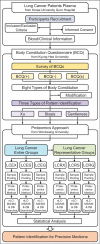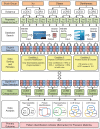Pattern identification of lung cancer patients based on body constitution questionnaires (BCQ) and glycoproteomics for precision medicine
- PMID: 31192960
- PMCID: PMC6587619
- DOI: 10.1097/MD.0000000000016035
Pattern identification of lung cancer patients based on body constitution questionnaires (BCQ) and glycoproteomics for precision medicine
Abstract
Background: The patient's pattern identification has been used for personalized medicine in traditional Korean medicine (TKM) and aims for patient-specific therapy by Korean medical doctors. The pattern identification in this trial will be diagnosed from body constitution questionnaire (BCQ) with a more objective diagnosis of it but this method still needs a more concrete scientific basis. Glycoproteins are well-known to be associated with diseases (especially cancers) so glycoproteomics can be applied to differentiate pattern identification types of lung cancer patients. Thus, for the first time proteomics approach will be applied to the pattern identification by comparing BCQ assessment in order to establish a scientific basis with clinical proteomics for precision medicine.
Methods: This observational trial will at first diagnose the pattern identification types of lung cancer patients with BCQ assessment and then elucidate their relationships with proteomics. Blood samples will be collected before surgery along with clinical information of participants. The patients' pattern identification in TKM will be diagnosed from BCQ assessment. Then, lung cancer patients will be divided and pooled into 3 lung cancer entire (LCE) groups according to their pattern identification types (Xu, Stasis, or Gentleness). Three lung cancer representative (LCR) groups will be selected and pooled from each LCE group by selecting those with the same control factors. The 3 LCE groups and the 3 LCR groups from lung cancer patients will be independently analyzed through the glycoproteomics approach based on the patients' pattern identification. Glycoproteins from the 6 groups will be identified through proteomics approach and then categorized for analysis.
Discussion: This study intends to diagnose pattern identification of patients in TKM with BCQ assessment and proteomics approach. The identification of the glycoproteins in each group will lead to the scientific foundation of personalized medicine in TKM according to patients' pattern identification for lung cancer therapy. We intend to(1) diagnose the pattern identification types of lung cancer patients with BCQ under the framework of TKM;(2) evaluate BCQ assessment with glycoproteomics approach for precision medicine.
Trial registration: ClinicalTrials.gov NCT03384680. Registered 27 December 2017. Retrospectively registered.
Conflict of interest statement
The authors have no conflicts of interest to disclose.
Figures
Similar articles
-
BCQ-: A Body Constitution Questionnaire to assess Yin-Xu. Part II: evaluation of reliability and validity.Forsch Komplementmed. 2012;19(6):285-92. doi: 10.1159/000346060. Epub 2012 Dec 18. Forsch Komplementmed. 2012. PMID: 23343583
-
BCQ+: a body constitution questionnaire to assess Yang-Xu. Part II: Evaluation of reliability and validity.Forsch Komplementmed. 2009 Feb;16(1):20-7. doi: 10.1159/000197770. Epub 2009 Feb 17. Forsch Komplementmed. 2009. PMID: 19295226
-
BCQ-: a body constitution questionnaire to assess Yin-Xu. Part I: establishment of a provisional version through a Delphi process.Forsch Komplementmed. 2012;19(5):234-41. doi: 10.1159/000343580. Epub 2012 Oct 18. Forsch Komplementmed. 2012. PMID: 23128097
-
Application of glycoproteomics for the discovery of biomarkers in lung cancer.Proteomics Clin Appl. 2012 Jun;6(5-6):244-56. doi: 10.1002/prca.201100042. Proteomics Clin Appl. 2012. PMID: 22641610 Free PMC article. Review.
-
Esophageal, gastric and colorectal cancers: Looking beyond classical serological biomarkers towards glycoproteomics-assisted precision oncology.Theranostics. 2020 Mar 31;10(11):4903-4928. doi: 10.7150/thno.42480. eCollection 2020. Theranostics. 2020. PMID: 32308758 Free PMC article. Review.
References
-
- Cancer Facts & Figures 2017 in the Republic of Korea. In: Ministry of Health and Welfare, National Cancer Center, eds. 2017.
-
- Kwon H-K, Kim J-S, Yoo H-S. Review for the current status of cancer complementary and alternative medicine in the world. J Korean Tradit Oncol 2009;14:1–1.
-
- Lee J-H, Bae K, Yoo H-S. The effect of traditional Oriental herbal medicine for anorexia in cancer patients: a systematic review. J Korean Med 2017;38:8–20.
-
- Choi Y-J, Lee J-S, Cho S-H. Use of Korean medicine among cancer patients. J Korean Orient Med 2012;33:46–53.
-
- Kim JM, Jeon HJ, Park SJ, et al. Preliminary study to develop the instrument on pattern identification for lung cancer. J Physiol Pathol Korean Med 2014;28:585–92.
Publication types
MeSH terms
Substances
Associated data
LinkOut - more resources
Full Text Sources
Medical



